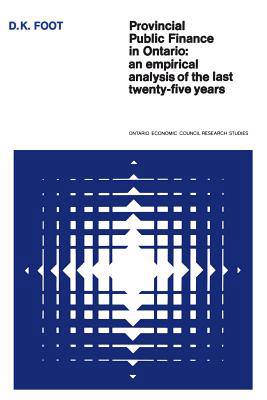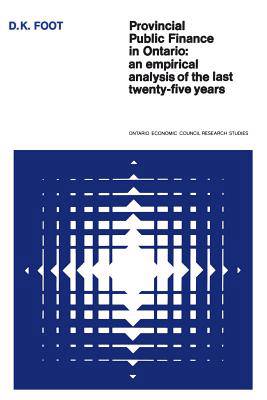
- Retrait gratuit dans votre magasin Club
- 7.000.000 titres dans notre catalogue
- Payer en toute sécurité
- Toujours un magasin près de chez vous
- Retrait gratuit dans votre magasin Club
- 7.000.0000 titres dans notre catalogue
- Payer en toute sécurité
- Toujours un magasin près de chez vous
Description
This detailed and informative study makes a timely contribution to a subject that has been the focus of much public discussion and debate in Ontario and elsewhere, namely the size and growth of the public sector. Working with the Public Accounts and other sources, Professor Foot offers both an historical account of, and an explanation for, the growth of provincial revenues and expenditures since the early 1950s. By concentrating on an analysis of the development of a single government over time, rather than adopting the traditional cross-section approach of analysing a number of junior-level governments.
The study's conclusions are both informative and provocative. On the revenue side, a rate-base approach which separates discretionary from automatic changes in revenue determinants is shown to provide sufficient flexibility to accommodate the analysis and explanation of a wide range of specific revenues. On the expenditure side, the provincial government is found to adjust reasonably slowly to new levels of desired expenditures which appear to be determined primarily by demand variables. Of particular interest are findings which suggest that urbanization and elections have had little effect on expenditures and that available federal money has tended to be a substitute for provincial funds. In addition, the author notes that provincial expenditure patterns are consistent with either a revenue-led interpretation, where the recent availability of pension funds has stimulated expenditures, or a leading-sector interpretation, which implies a longer-run coordinated view of provincial public development.
This study should stimulate a more informed discussion of the determinants and effects of provincial public finance in Ontario. It will appeal not only to those interested in the behaviour of junior-level governments but also to anyone interested in the size and growth of the public sector, in Ontario or elsewhere.
Spécifications
Parties prenantes
- Auteur(s) :
- Editeur:
Contenu
- Nombre de pages :
- 228
- Langue:
- Anglais
- Collection :
Caractéristiques
- EAN:
- 9780802033505
- Date de parution :
- 15-12-77
- Format:
- Livre broché
- Format numérique:
- Trade paperback (VS)
- Dimensions :
- 152 mm x 229 mm
- Poids :
- 340 g

Les avis
Nous publions uniquement les avis qui respectent les conditions requises. Consultez nos conditions pour les avis.






